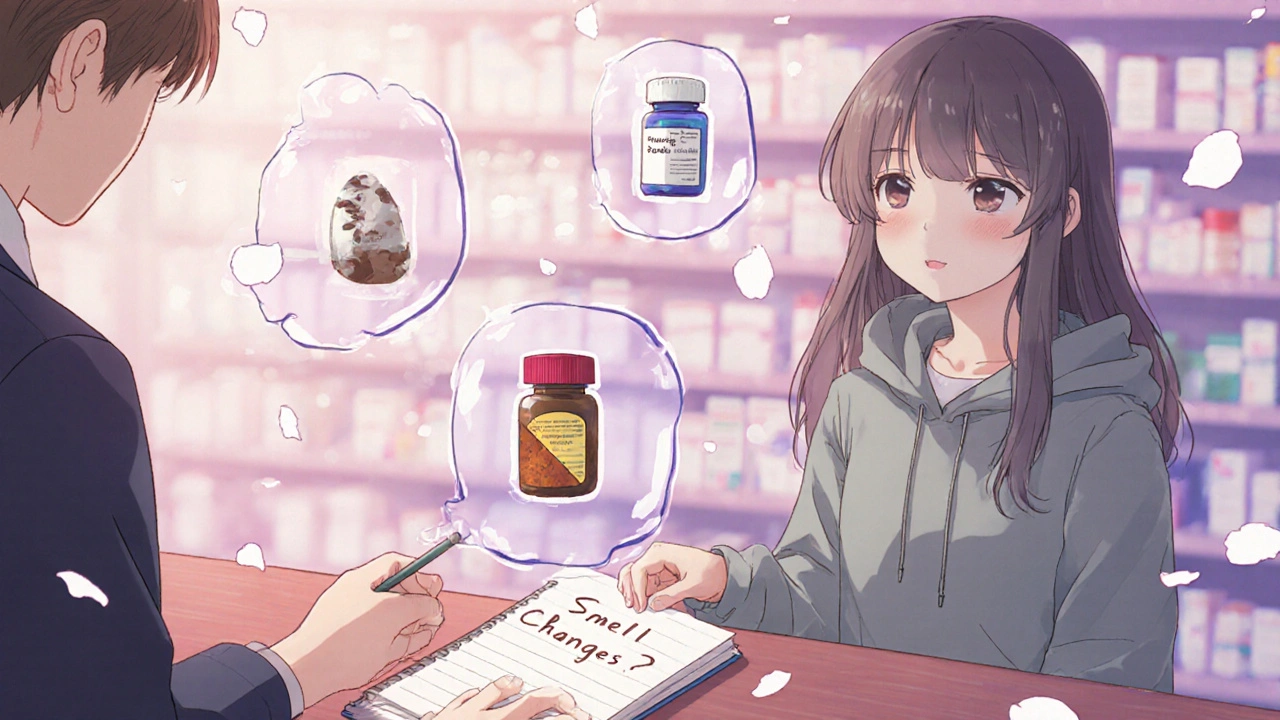Medications That Change Your Sense of Smell: What You Need to Know About Dysosmia

Medication Smell Risk Checker
Common Medication Categories
Antibiotics
High Risk
Fluoroquinolones (levofloxacin, moxifloxacin), macrolides (azithromycin, clarithromycin)
Cardiovascular
Medium Risk
Midodrine (used for low blood pressure)
Neurological
High Risk
Carbamazepine, baclofen
Thyroid & Diabetes
Medium Risk
Carbimazole, tolbutamide
IV Medications
High Risk
Lidocaine, iron infusions, thyrotropin-releasing hormone
What if your favorite coffee started tasting like ash? Or the smell of fresh bread made you gag? You’re not imagining it. Many people on common medications experience this - a strange, often disturbing shift in how smells and tastes work. It’s called dysosmia, and it’s more common than most doctors admit.
What Is Dysosmia, Really?
Dysosmia isn’t just losing your sense of smell. It’s when familiar scents turn wrong. The smell of your partner’s perfume might suddenly smell like rotting meat. Your morning toast could taste metallic, like licking a battery. Sometimes, you smell things that aren’t there - smoke, chemicals, or spoiled food - even when the room is clean. This isn’t just annoying. It’s life-changing. People stop eating because food tastes terrible. Some lose weight rapidly. Others become anxious, isolated, or depressed because they can’t trust their own senses. A 1995 study found that up to 30% of people with medication-induced smell changes lost significant weight because they couldn’t enjoy meals anymore. It’s not rare. Over 500 medications are known to cause this. But because most doctors don’t ask about smell, it’s often missed. Patients get scanned for brain tumors, tested for Parkinson’s, or told it’s “just stress.” Meanwhile, the real culprit is the antibiotic they took last month or the blood pressure pill they started six weeks ago.Which Medications Are Most Likely to Cause Smell Changes?
Not all drugs affect smell the same way. Some hit the nose directly. Others mess with nerve signals or taste cells in the mouth. The biggest offenders fall into a few clear categories:- Antibiotics - Especially fluoroquinolones like levofloxacin and moxifloxacin, and macrolides like azithromycin and clarithromycin. These drugs pull zinc and magnesium out of your nasal cells, which are critical for smell function. One study showed azithromycin increases risk by 2.3 times. Symptoms often show up within 7-14 days of starting the drug.
- Cardiovascular drugs - Midodrine, used for low blood pressure, is a known trigger. It doesn’t damage cells - it changes how nerve signals are sent to the brain.
- Neurological medications - Carbamazepine (for seizures) and baclofen (for muscle spasms) can cause severe, long-lasting distortions. Some people lose taste entirely.
- Thyroid and diabetes drugs - Carbimazole and tolbutamide have been linked to sudden smell loss.
- IV medications - Lidocaine, iron infusions, and thyrotropin-releasing hormone can cause a metallic taste within minutes of injection.
Why Does This Happen? The Science Behind the Smell Breakdown
Your nose doesn’t just detect smells - it’s a complex chemical sensor. Odor molecules bind to receptors in your nasal lining, triggering signals to your brain. Medications interfere at several points:- Blocking receptors - Some drugs physically block odor molecules from attaching to their targets.
- Disrupting signaling - Drugs like sertraline can slip into cell membranes and mess with G-proteins and TRPM5 channels that relay smell signals.
- Preventing signal shutdown - Normally, receptors turn off after detecting a smell. If they stay active, your brain keeps getting false signals - like a broken light switch stuck on.
- Reducing zinc and calcium - Fluoroquinolones and tetracyclines bind to these minerals, which your smell cells need to regenerate. No zinc? No new smell cells. That’s why symptoms can last weeks after stopping the drug.

How Long Does It Last? Recovery and Timeframes
The good news? Most cases get better. A 1995 study found that 78% of people recover their sense of smell within three months after stopping the medication. But 22% don’t - and that’s where things get complicated. Some people recover fast. One case study reported complete relief from metallic taste just five days after switching from an antidepressant to mirtazapine. Others struggle for over a year. Reddit users describe 22-month battles with parosmia after azithromycin, losing 15% of their body weight because nothing tasted edible. Recovery depends on:- Which drug caused it - Antibiotics often resolve faster than neurological drugs.
- How long you took it - Longer exposure = longer recovery.
- Whether you stopped the drug - Many keep taking it because it’s essential (like blood pressure meds), making recovery harder.
- Your age and health - Older adults and those with prior smell loss recover slower.
What Can You Do About It?
There’s no magic pill. But there are smart steps:- Don’t panic - but don’t ignore it. Smell changes are rarely a brain tumor. But they also aren’t “just in your head.”
- Check your meds. Look up your medications on MedLink Neurology’s 2022 list or the FDA’s Adverse Event Reporting System. If it’s on the list, that’s your clue.
- Don’t quit cold turkey. If you’re on a heart or seizure med, talk to your doctor before stopping. They might switch you to a different drug in the same class.
- Ask for a smell test. The University of Pennsylvania Smell Identification Test (UPSIT) is a 40-item test that measures your ability to identify common scents. It’s quick, non-invasive, and can confirm if your smell is truly impaired.
- Be careful with zinc. Many people try zinc supplements. But unless you’re deficient (which is rare in healthy adults), it won’t help - and it can cause copper deficiency. Dr. Thomas Hummel of Dresden warns against it as a blanket fix.
- Try smell training. Smell training - sniffing strong scents like rose, lemon, eucalyptus, and clove for 10 minutes twice a day - has helped some people regain function. It’s low-risk and may rewire your brain’s smell pathways.

Why Isn’t This More Widely Known?
It’s a system failure. Most doctors don’t ask about smell during medication reviews. A 2022 JAMA survey found only 37% of primary care doctors routinely check for smell changes. But 78% of ear, nose, and throat specialists do. That gap means many patients fall through the cracks. Also, there’s no mandatory reporting for smell side effects in most countries. If you have a rash from a drug, it’s recorded. If you smell smoke that isn’t there? Often, nothing happens. The industry is waking up. The FDA now encourages drug makers to track smell and taste changes in clinical trials. AstraZeneca even patented a treatment for drug-induced smell loss in 2022. The European Medicines Agency will require smell testing in all new antibiotic trials starting in 2024. But until then, you have to be your own advocate.When to See a Specialist
See an otolaryngologist (ENT) if:- Your smell or taste changes started after beginning a new medication.
- The problem lasts longer than 3 months after stopping the drug.
- You can’t detect dangerous smells like gas, smoke, or spoiled food.
- You have other neurological symptoms - headaches, dizziness, vision changes.

Eric Healy
November 17, 2025 AT 13:52Shannon Hale
November 19, 2025 AT 12:59Holli Yancey
November 19, 2025 AT 15:51Gordon Mcdonough
November 19, 2025 AT 19:23Jessica Healey
November 20, 2025 AT 00:33Levi Hobbs
November 20, 2025 AT 11:30henry mariono
November 21, 2025 AT 05:29Sridhar Suvarna
November 23, 2025 AT 05:12Joseph Peel
November 25, 2025 AT 04:42Kelsey Robertson
November 27, 2025 AT 01:17